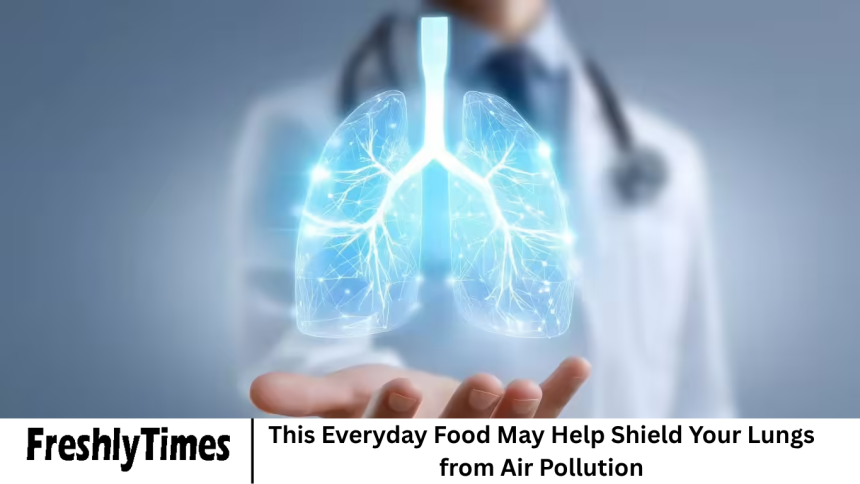Air pollution is one of the most significant global health challenges of our time. From smog-filled urban skies to microscopic particulates that penetrate deep into our lungs, the impact of polluted air on human health is far-reaching and devastating.
- The Global Air Pollution Crisis: Why Lungs Need Extra Protection
- The Science Behind Broccoli’s Protective Power
- Anti-Inflammatory and Antioxidant Effects
- Broccoli Sprouts: The Most Potent Form
- How Broccoli Protects More Than Just Lungs
- Incorporating Broccoli into Your Diet
- Raw Salads and Smoothies
- Lightly Steamed Broccoli
- Broccoli Soup
- Stir-Fry with Garlic and Ginger
- Broccoli Sprout Juice
- Other Foods That Support Lung Health
- The Future of Nutrition-Based Pollution Defense
- The Bottom Line: Small Food, Big Impact
- Frequently Asked Question
- Conclusion
Yet, amidst the gloomy headlines about worsening air quality, there’s some hopeful news emerging from the scientific community. Recent research suggests that a common, everyday food found in most kitchens may help protect your lungs from the damage caused by air pollution.
In this comprehensive article, we’ll explore how broccoli and its natural compounds support lung health, what science says about its anti-pollution effects, how you can include it in your diet, and what this means for populations living in polluted environments.
More Read: U.K. Health Service Crisis Threatens Core of British Society
The Global Air Pollution Crisis: Why Lungs Need Extra Protection
Air pollution is not just an environmental problem—it’s a major health crisis. The tiny particles floating invisibly in the air, known as PM2.5 and PM10, along with harmful gases like nitrogen dioxide, ozone, and carbon monoxide, can wreak havoc on our respiratory systems.
When inhaled, these particles can penetrate deep into the alveoli—the air sacs in the lungs where oxygen exchange occurs. Over time, this can lead to chronic inflammation, reduced lung capacity, asthma, chronic obstructive pulmonary disease (COPD), and even lung cancer.
According to the Lancet Commission on Pollution and Health, air pollution is responsible for over 6.7 million premature deaths each year. Among the most affected are children, the elderly, and individuals with preexisting respiratory conditions.
Given the challenges of reducing global emissions quickly enough, scientists have turned their attention to how nutrition might help mitigate the effects of pollution on the human body. That’s where broccoli and its unique compounds come into play.
The Science Behind Broccoli’s Protective Power
Broccoli belongs to the cruciferous vegetable family, which also includes kale, cabbage, cauliflower, and Brussels sprouts. What makes broccoli stand out nutritionally is its high concentration of sulforaphane, a sulfur-rich compound with extraordinary detoxifying and anti-inflammatory properties.
Sulforaphane: The Lung’s Natural Defender
Sulforaphane is formed when broccoli is chopped or chewed, triggering a chemical reaction between the enzyme myrosinase and the compound glucoraphanin. This natural process activates sulforaphane—a compound that’s been extensively studied for its health benefits.
In the context of air pollution, sulforaphane acts as a cellular shield, enhancing the body’s ability to neutralize and eliminate harmful toxins. It does this primarily by activating Nrf2 (nuclear factor erythroid 2–related factor 2), a protein that regulates the expression of antioxidant and detoxification enzymes.
When Nrf2 is activated, it boosts the body’s natural defenses against oxidative stress—a key mechanism by which air pollution damages lung tissue.
Detoxification of Airborne Pollutants
A landmark study published in the journal Cancer Prevention Research in 2014 revealed that drinking a broccoli sprout beverage significantly increased the excretion of air pollutants in human subjects.
The study, conducted in one of the most polluted regions of China, involved 291 participants who drank a broccoli sprout–based beverage daily for 12 weeks. Researchers found that participants excreted 61% more benzene and 23% more acrolein—both toxic compounds found in air pollution—than those who didn’t consume the drink.
This discovery was groundbreaking because it demonstrated that certain compounds in broccoli can accelerate the body’s ability to eliminate harmful pollutants through urine, effectively reducing the internal burden of toxins.
Anti-Inflammatory and Antioxidant Effects
Air pollution triggers oxidative stress, leading to chronic inflammation in the respiratory system. Over time, this inflammation damages lung tissue, reduces elasticity, and impairs oxygen exchange.
Sulforaphane has shown promise in reducing inflammatory markers such as IL-6 and TNF-α (tumor necrosis factor-alpha). By dampening these inflammatory pathways, broccoli may help preserve lung function and prevent the progression of diseases like asthma and COPD.
Moreover, sulforaphane enhances the activity of antioxidant enzymes like glutathione peroxidase and catalase, which help neutralize harmful free radicals generated by pollution exposure.
Broccoli Sprouts: The Most Potent Form
While mature broccoli offers significant health benefits, broccoli sprouts contain up to 20 times more glucoraphanin, the precursor to sulforaphane.In other words, a small handful of sprouts can provide the same protective compounds found in several servings of cooked broccoli.
Sprouts are easy to grow at home or can be purchased at health food stores. They can be added to salads, smoothies, or sandwiches for a nutritional boost. Because heat destroys the myrosinase enzyme needed to activate sulforaphane, it’s best to consume broccoli sprouts raw or lightly steamed.
How Broccoli Protects More Than Just Lungs
Beyond its lung-protective effects, broccoli’s compounds have been linked to numerous other health benefits, many of which are interconnected with the body’s response to pollution.
Cardiovascular Protection
Air pollution doesn’t just harm the lungs—it also contributes to heart disease and stroke by promoting systemic inflammation and oxidative stress. Sulforaphane’s antioxidant properties help reduce arterial stiffness and improve endothelial function, both of which are crucial for heart health.
Immune System Support
A strong immune system helps the body cope with environmental stressors. Broccoli’s rich mix of vitamin C, beta-carotene, zinc, and selenium supports immune defense, while sulforaphane boosts the production of protective enzymes that help immune cells function effectively.
Cancer Prevention
Several studies have shown that cruciferous vegetables like broccoli may lower the risk of certain cancers, including lung cancer, due to sulforaphane’s ability to neutralize carcinogens and promote healthy cell cycles.
Incorporating Broccoli into Your Diet
Here are some simple, practical ways to add more broccoli and its sprouts to your diet for maximum benefits:
Raw Salads and Smoothies
Add a handful of fresh broccoli sprouts to salads, sandwiches, or smoothies. Combine them with citrus fruits for added vitamin C, which may further enhance antioxidant activity.
Lightly Steamed Broccoli
Steaming broccoli for about 3–4 minutes helps retain its nutrients while improving digestibility. Avoid overcooking, as excessive heat can destroy sulforaphane-producing enzymes.
Broccoli Soup
Combine steamed broccoli with garlic, onion, and a bit of olive oil to make a creamy, antioxidant-rich soup.
Stir-Fry with Garlic and Ginger
Garlic and ginger complement broccoli’s health properties with their own anti-inflammatory and antimicrobial effects.
Broccoli Sprout Juice
Blend broccoli sprouts with apple, cucumber, and lemon for a refreshing detox drink.
Other Foods That Support Lung Health
While broccoli is the star, other foods also contribute to protecting the lungs from pollution:
- Turmeric: Contains curcumin, a powerful anti-inflammatory compound.
- Green tea: Rich in catechins that protect cells from oxidative stress.
- Omega-3-rich foods (like salmon and flaxseeds): Help reduce inflammation in the respiratory system.
- Apples: Contain quercetin, which improves lung function.
- Carrots: High in beta-carotene, which helps repair lung tissue.
Combining these foods with broccoli can create a nutrient synergy that amplifies overall protection.
The Future of Nutrition-Based Pollution Defense
The emerging field of nutritional toxicology focuses on how diet influences the body’s ability to cope with environmental toxins. Scientists are now exploring how sulforaphane and similar compounds could be developed into supplements or functional foods for populations exposed to high levels of pollution.
In urban areas where air quality continues to deteriorate, such dietary interventions could serve as a low-cost, accessible public health strategy to reduce the disease burden associated with pollution exposure.
However, experts emphasize that while foods like broccoli offer protective benefits, they cannot replace broader policy actions—such as reducing emissions, improving air quality standards, and promoting clean energy solutions.
The Bottom Line: Small Food, Big Impact
The idea that a simple vegetable could help defend our lungs from the world’s most pervasive pollutant is both fascinating and empowering. Broccoli’s active compounds, particularly sulforaphane, help detoxify harmful chemicals, reduce inflammation, and strengthen the body’s antioxidant defenses.
By making this humble vegetable a regular part of your diet—whether as steamed florets or crunchy sprouts—you can take a small but meaningful step toward protecting your respiratory health. As urban pollution continues to challenge global health systems, the answer may partly lie not just in cleaner air, but also in smarter eating.
After all, sometimes the most powerful medicine grows right on our plates.
Frequently Asked Question
What makes broccoli effective against air pollution damage?
Broccoli contains sulforaphane, a compound that activates the body’s detoxification enzymes and antioxidant defenses. This helps neutralize and eliminate harmful pollutants that enter the body through inhalation.
Can eating broccoli really protect my lungs?
Yes, studies show that compounds in broccoli, particularly sulforaphane from broccoli sprouts, can enhance the body’s ability to detoxify pollutants and reduce inflammation in the lungs, providing measurable protective effects.
Are broccoli sprouts better than regular broccoli?
Broccoli sprouts contain up to 20 times more glucoraphanin, the precursor to sulforaphane, making them more potent in activating the body’s detox systems. Both are beneficial, but sprouts are especially effective.
How often should I eat broccoli for lung protection?
For optimal benefits, include broccoli or broccoli sprouts 3–4 times a week. Consistency is key, as sulforaphane’s effects build up over time with regular intake.
Can broccoli supplements provide the same benefits?
Some supplements claim to contain concentrated sulforaphane or glucoraphanin. However, their effectiveness varies depending on formulation and enzyme stability. Whole foods like broccoli and sprouts are generally more reliable sources.
Does cooking destroy broccoli’s protective compounds?
High heat can deactivate the enzyme myrosinase, reducing sulforaphane production. Light steaming for 3–4 minutes preserves most of its benefits, while raw consumption ensures maximum potency.
Can other foods also help protect against air pollution?
Yes. Foods like turmeric, green tea, apples, carrots, and omega-3-rich sources complement broccoli’s effects by reducing inflammation and supporting antioxidant defenses.
Conclusion
Air pollution poses one of the most urgent and invisible threats to human health, silently damaging our lungs and overall well-being. While global efforts to reduce emissions and improve air quality are essential, individuals can also take meaningful steps to protect themselves—starting with what they eat.
Among the many foods studied for their protective effects, broccoli stands out as a natural powerhouse. Its key compound, sulforaphane, activates the body’s detoxification pathways, boosts antioxidant defenses, and reduces inflammation—all of which help the lungs fight the harmful effects of polluted air.














